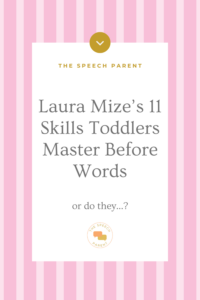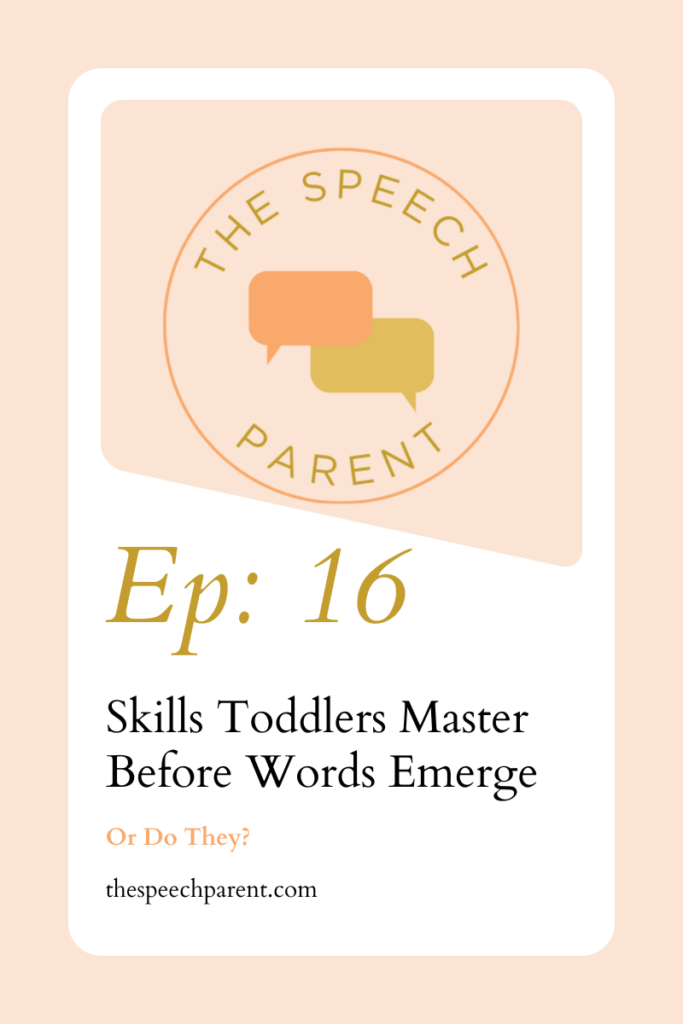Hello hello and welcome back to (reading) another episode of the Speech Parent Podcast. I’m so glad you’re here. Today we’re discussing Laura Mize’s skills toddlers master before words emerge…or do they? If this is your first time on the blog, then I want to welcome you and remind you that we cover a wide variety of topics here on the blog, but the common theme is that it is content designed to help YOU as a parent of a child with a speech delay.
Maybe your child has trouble saying sounds correctly like we talked about in last week’s episode. Or maybe your child has difficulty communicating with peers or making friends or maybe they don’t have words yet! Whatever they are working on and whatever you have questions about, I am here for you. I want to help you, I want to answer your questions as a speech therapist AND a fellow speech parent.
So remember that you can always submit any questions regarding speech or communication or eating or memory or executive functioning or any of the things that us speech therapists work on. Send me an email any time at thespeechparent@gmail.com. If you want, I can answer it live on the show during a QandA episode or just answer privately in email. So don’t forget that is always an option, just email thespeechparent@gmail.com. Now let’s get started on TODAY’s blog post – Skills Toddlers Master Before Words Emerge (or do they?) We’re going to discuss why or why not these skills are an important foundation for talking.
Skills Toddlers Master Before Words Emerge
So like with most things, there is more than 1 school of thought on how toddlers or young children acquire language and verbalize it with mouth words – aka how they talk. Even among different speech therapists or speech therapy researchers. There are a LOT of factors involved in talking. There is the language development piece of talking so the actual content of what you’re saying like your vocabulary, grammar, sentence structure, etc. Then there is the speech development piece of talking which is how you are able to form the sounds and go through the movements necessary to produce what it is you’re trying to say.
There are tons of factors at play. As such, there are lots of reasons why a child may not be talking yet. There are certain people in the world of speech pathology that have kind of niched down to explain a very specific way or roadmap to talking. Sometimes it is with a particular population, like kids with autism. Or sometimes they are speaking in general.
Today we are going to look at a very common roadmap that speech therapists all over the country use to guide their therapy goals and sessions. Speech pathologists will use it as a framework to inform them of the skills that a child should work on before they will start to talk.
Now I’m sure the developer of this program, Laura Mize, has tons of research and experience that she uses to back up this framework that is in her book and program called “Let’s Talk About Talking” and “Teach Me to Talk”. So if you want that background information or want more information in general, you can read all about Laura Mize’s work at her website on teachmetotalk.com or watch her videos on YouTube.
But today I want to just let you know that this framework exists and go over it with you broadly. In other episodes we can get more specific.
But I don’t exactly agree with Laura Mize…
But I will begin with the caveat that not everyone agrees with Laura Mize on this. I, in fact, do not completely agree with her that every toddler masters these pre foundational language skills before they start talking. Especially my kiddos with autism or those that are gestalt language processors. They do not need all of these skills to start using words, and many don’t. However, I do think these are generally important foundational skills to language development and I have noticed that kids generally do acquire these skills before talking.
So while I think they are skills worth talking about and learning about, and even targeting in therapy, I think it’s important that we hold them with an open hand. And that we hold them in addition to other knowledge about gestalt language processors and kids with apraxia and all the tips and tricks that other people have discovered as well.

I have used this framework in countless evaluations and it’s been really helpful for parents, in my experience, to have a concrete checklist of things that they can work on with their child to get them talking. Again, hold it with an open hand because there could be a lot of other things at play that is impacting your child’s ability to talk – specifically they don’t have enough gestalts yet if they’re a gestalt language processor or they have trouble getting their mouth muscles to coordinate and move in the way that they want if they have apraxia.
There are also things to consider that I don’t have time to get into in this episode. So don’t base everything off of this framework, but I do think it’s helpful to see where your child is at and what they could still be working on. Not as pre-requisite to communication because there aren’t any – everyone deserves to communicate and many do without words. But as a general guideline for talking with your mouth if no other issues are at play.
So without further ado, here are the 11 skills that Laura Mize says Toddlers Master Before Words Emerge.
Laura Mize’s 11 Skills Toddlers Master Before Words
Skill #1 – The child reacts to events in the environment. Does your child consistently react to things they see or hear or feel? Responding is important for communication interactions!
Skill #2 – The child responds to PEOPLE when they talk to or play with him or her. Does your child enjoy being around other people and respond to them consistently?
Skill #3 – The child takes turns with you during interactions. Does your child engage in back and forth interactions with you?
Skill #4 – The child develops a longer attention span. This one is hard for me, as the mom of a child with severe ADHD. He was talking way before he met her requirement of staying with an activity for at least 5 minutes alone. But I still see increasing attention span as a worthy goal in general.
Skill #5 – The child shifts and shares joint attention with others. Does your child look at you and then look at an object that you’re both focused on?
Skill #6 – The child plays with a variety of toys appropriately. This one gets a lot of pushback, specifically in regard to autistic children and how they play differently. I leave off “appropriately” in my version of it, but I do like to teach autistic children how they can functionally play with toys (by modeling, never forcing) as many just don’t pick up on it naturally. However, this skill is truly not necessary and all play, even sensory based or stimming or not doing anything “functional” is still play and still valid.
Skill #7 – The child understands early words and follows simple directions. Does your child complete requests? I think working on following directions is a great goal rooted in language development. It’s functional, keeps children alive and safe, and is necessary in basically all environments.
Skill #8 – The child vocalizes or makes sounds purposefully. This is another tricky one, especially for intervention, because I don’t believe in teaching non-functional sounds in attempt just to get a kid to vocalize. I’ve seen it in other therapy models and I don’t believe it is helpful for the child to gain functional communication. But I do think a lot of kids may be making sounds purposefully and WE as listeners may not be understanding their purpose. We may need to tune in more and investigate.
Skill # 9 – The child imitates actions, gestures, sounds and words. Does your child copy what others do or say? This is one I make goals for a lot. I start with gross motor movements like clapping or stomping or in play.
Skill #10 – The child uses early gestures like waving and pointing. Some autistic kids may not be into gestures as much, but there are research studies out there showing the correlation between gestures and language development.
SKill #11 – The child initiates interaction with others to get needs met or to play. Does your child deliberately work to get your attention to get what they want? Communicating their wants and needs is so important!
My 5 Day Late Talker Challenge
Alright now there you have it! The 11 Skills that Laura Mize says Toddlers master before words emerge. Again, hold this with an open hand, but use it as a guide on skills your child may need more help with. If your child is not yet talking, then you could really benefit from the strategies I teach in my 5 day Late Talker Challenge. It comes straight to your email as a little freebie I created just for parents of kids who aren’t really talking yet. You can get it by going to thespeechparent.com/latetalkerchallenge that’s thespeechparent.com/latetalkerchallenge
I can also totally dive deep into each of these skills toddlers master before words and talk about ways that you can work on them at home with your child. So if you would like that, then please let me know! You can email me at thespeechparent@gmail.com, send me a dm on social media or comment below. I also recommend you check out Parentese – How You Should Talk to Your Child if you’re looking for a powerful quick tip to help your child’s language development!
Thanks for reading my thoughts on the skills toddlers master before words emerge. As always, thank you for being here and thank you for loving your kid so much that you listened to this episode. I know that you’re an incredible parent, and I’m really proud of you. As always, remember the best is yet to come!
